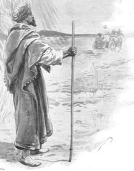the eunuch of Ethiopia
10-10-2011 - Posted by Andre Piet  From a visitor to GoedBericht.nl I received the following question:
From a visitor to GoedBericht.nl I received the following question:
Dear Andre, We have a puzzling question. We are not able to see the logic of Acts 8 and 10. In Acts 8, Philip goes and meets up with an Ethiopian man. After he explained some out of Isaiah 53, which the Ethiopian man was reading (strange, he has a Torah scroll ?? can read Hebrew?), Philip baptizes him in water, because he believes that Jesus is the Son of God. No repentance, no confession, etc., while Peter, in Acts 11, had to defend himself against the Jews, why he had entered into the house of a Gentile, Cornelius, and even had baptized him. I hope that our question is clear and if it ever has been raised before, sorry for the inconvenience, but we can find nowhere a satisfactory answer. Thanks in advance for your trouble. Sincerely, …
This question has been presented to me more often, but so far has not been dealt with on the GoedBericht-site. The mere fact that prior to Acts 10 (the story of Cornelius), no disciple in his right mind would even go “within the gates of a stranger”, indicates that in the history of Acts 8, it is difficult to accept the conversion and baptism of a gentile (heathen). No heathen Philip was to approach the chariot of the high political official, who was, according the Greek language, a eunuch, (castrated for political reasons). This man had come to Jerusalem to worship (8:27) and on his way back, was reading out of the scroll of Isaiah (8:28). That the man would have read the scroll in Hebrew, is not said. Probably not, because the text quoted from Isaiah is taken directly from the Septuagint (LXX), which is the Greek translation of the Old Testament. From the description in Acts 8, we can only conclude that the Ethiopian man was either, a Jew living in a foreign land, or a convert to Judaism (a proselyte). And that explains why Philip did not hesitate to approach this man to explain to him the Evangel. a later addition The strange words of verse 37, to which the writer of the e-mail question was referring, obviously is a later addition to the record, which are not written by Luke. These are the words:
Then Philip said, “If you believe with all your heart, you may.” And he answered and said, “I believe that Jesus Christ is the Son of God.”*
In the three oldest, great manuscripts of the “New Testament” (Alexandrinus, Vaticanus and Sinaiticus) verse 37 is missing. That is why most of the translations either, do not have this text or, they place it within square brackets. The church practices of baptism, preceded with an examination, was evidently an attempt to justify the practice by adding this text to the original scripture. ——————————— translation: Peter Feddema ![]()

 English Blog
English Blog